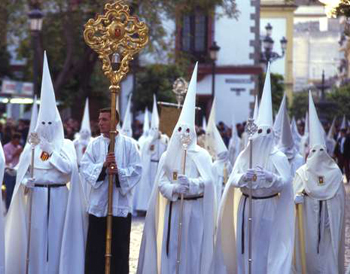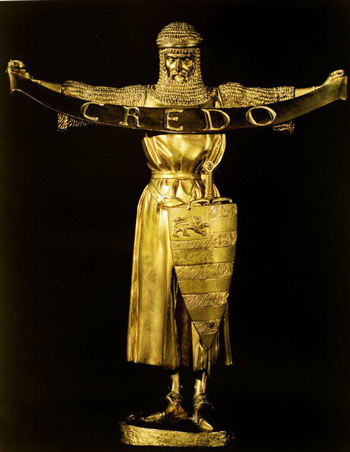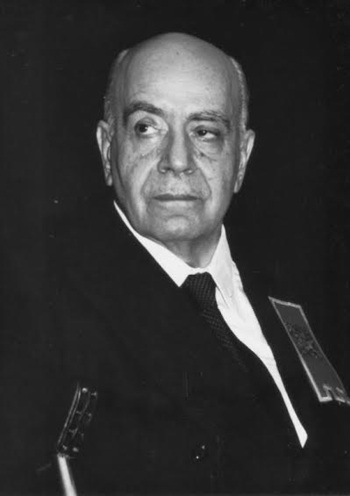Catholic Virtues
 |
 |
 |
 |
 |
 |
 |
Trio of Counter-Revolutionary Virtues - II
The Lack of Vigilance and the
Role of ‘White Heresy’
In the last article we saw the great religious fervor that was rekindled in the Spanish Civil War in the fight against Communism and contrasted it with the pro-communist spirit we find there today.
 What can we see in this whole panorama? A great religious fervor – a great grace for Spain – that has completely disappeared.
What can we see in this whole panorama? A great religious fervor – a great grace for Spain – that has completely disappeared.
And why did it disappear? Was it because of a lack of prayer? I would say that it was something more, for Spain was a country where there was much prayer. The problem is that those who speak of prayer need to follow the full counsel of Our Lord who told us, "Watch and pray" (Mt 26:41). They pray, but do not watch; they develop a spirit of prayer, but do not develop the spirit of vigilance.
That is to say, they did not have the necessary suspicion of those who are evil; they did not bother to perceive their maneuvers, to unravel their game or run their own game against it, which would have allowed the evil to be perceived and avoided.
But, the greater part of Spaniards did not act in this way. They had a treasure that they did not keep in a secure place, but left it in the middle of the street for any thief to take. The treasure of Spain was its moral qualities, its weakness was a lack of vigilance.
That magnificent surge of heroism was annihilated and in a few years had been reduced to almost nothing. In the example of Spain, we can see one of the worst lacunas of "white heresy." (1) The opposite of it must be one of the characteristics of the counter-revolutionary Catholic.
Note 1: "White heresy" is a jargon among counter-revolutionaries that indicates a sentimental mentality that manifests itself primarily as a sweet piety and a non-militant and relativistic doctrinal position, which always makes excuses for others, including enemies, under the pretext that they deserve "charity." This mindset paves the way for heresy properly speaking. So, this tendencial preparation for real heresy – the "black heresy" – is called "white heresy."
Suspicion, vigilance, pugnacity
The counter-revolutionary is vigilant, suspicious, pugnacious. The non-counter-revolutionary is not vigilant, not distrustful, not pugnacious. To place these characteristics in the correct order: suspicious, vigilant, pugnacious.
Suspicion
What is suspicion? It is the habitual persuasion that we live in a vale of tears. And that in this vale of tears – which is this earth where one lives in a state of trial, in a state of original sin – man carries the sin of Revolution inside himself. He is continuously flanked and surrounded by dangers: dangers both from within and outside, to which one must be continuously attentive and alert. This is the fundamental idea.
 In the spiritual life, each of us must have toward himself – and I will never tire of saying this – the mistrust that a man has toward a beast or a serpent. A beast and a serpent are inside me and inside each one of us. If I relax in my vigilance, however little it may be, I will make concessions; if I make concessions, I will nourish my faults. If I nourish my faults, I will not have the strength to overcome them, and my spiritual life will fall to the ground.
In the spiritual life, each of us must have toward himself – and I will never tire of saying this – the mistrust that a man has toward a beast or a serpent. A beast and a serpent are inside me and inside each one of us. If I relax in my vigilance, however little it may be, I will make concessions; if I make concessions, I will nourish my faults. If I nourish my faults, I will not have the strength to overcome them, and my spiritual life will fall to the ground.
I need to be very vigilant, to have my eyes open and continually turned toward myself, to see what I am feeling, what is happening inside me, to cut off the evil that is constantly being reborn.
The good man is not the foolish and naïve man who thinks that evil tendencies are not reborn inside himself. The good man is the serious man, who knows that these tendencies are reborn and that he must continuously struggle against himself. Every man has evil tendencies which, if he acquiesces to them, will rapidly lead him to infamy. This is the notion that each of us must have of himself. As a consequence of this suspicion each one must have of himself, the duty of vigilance is born, for he who is suspicious is vigilant.
Vigilance
What is it to be vigilant? It is to be watchful, attentive, wakeful, in a state of constant lookout. The attentive man watches. He says to himself: Since I know that I have in myself a continuous source of the worst defects already ready to surface, I must watch myself. If I am not vigilant over myself, I will fall. The logical fruit of mistrust – mistrust as a corollary of belief in the dogma of original sin – is vigilance over oneself.
Pugnacity
Is vigilance enough? No. It is necessary to be pugnacious. And what is the pugnacious man? It is the man who normally and stably is prepared to enter a fight at any moment. Even if it is a very hard fight, he does not hesitate to enter it. If it is necessary, he fights. It is not the cretin who fights without reason, it is the man who fights because it is his duty to do so.
 Our pugnacity toward ourselves implies that we are willing to fight against ourselves at all times. We must be willing to say "no" to ourselves at every moment. The first person I have to know how to say "no" to is myself, not another.
Our pugnacity toward ourselves implies that we are willing to fight against ourselves at all times. We must be willing to say "no" to ourselves at every moment. The first person I have to know how to say "no" to is myself, not another.
It is fruitless to be energetic with others, to say "no" to others, to be combative with others: this is easy. The problem is to be combative with myself, to tell myself "no" when "no" must be said. And to do this in every case where it is necessary to say "no" and at the very moment "no" should be said.
The pugnacious man fights his faults as soon as they appear. As soon as vigilance points to the rebirth of one bad tendency, the pugnacious man suffocates it, denies it, cuts it off. If he does not do this, he perishes, because the bad tendency grows and makes him weak. The bad tendencies have to be fought at their onset, at the first inclination, at the first moment. It cannot be otherwise.
Virility, fruit of vigilance
You have seen here the trilogy of vigilance applied to the interior life. Sadly, what characterized the Catholic media of the last 20 or 30 years prior to the progressivist tidal wave was the lack of these qualities.
People had virtue, but they lacked vigilance. There was no talk of vigilance in any sense of the word. Piety was sweet, without fiber, without manliness. And piety needs to have that virility. The first moment of manhood is to be vigilant with oneself. That is the starting point of true virility.
Continued


Religious piety, but a lack of vigilance led to Socialism in Spain
And why did it disappear? Was it because of a lack of prayer? I would say that it was something more, for Spain was a country where there was much prayer. The problem is that those who speak of prayer need to follow the full counsel of Our Lord who told us, "Watch and pray" (Mt 26:41). They pray, but do not watch; they develop a spirit of prayer, but do not develop the spirit of vigilance.
That is to say, they did not have the necessary suspicion of those who are evil; they did not bother to perceive their maneuvers, to unravel their game or run their own game against it, which would have allowed the evil to be perceived and avoided.
But, the greater part of Spaniards did not act in this way. They had a treasure that they did not keep in a secure place, but left it in the middle of the street for any thief to take. The treasure of Spain was its moral qualities, its weakness was a lack of vigilance.
That magnificent surge of heroism was annihilated and in a few years had been reduced to almost nothing. In the example of Spain, we can see one of the worst lacunas of "white heresy." (1) The opposite of it must be one of the characteristics of the counter-revolutionary Catholic.
Note 1: "White heresy" is a jargon among counter-revolutionaries that indicates a sentimental mentality that manifests itself primarily as a sweet piety and a non-militant and relativistic doctrinal position, which always makes excuses for others, including enemies, under the pretext that they deserve "charity." This mindset paves the way for heresy properly speaking. So, this tendencial preparation for real heresy – the "black heresy" – is called "white heresy."
Suspicion, vigilance, pugnacity
The counter-revolutionary is vigilant, suspicious, pugnacious. The non-counter-revolutionary is not vigilant, not distrustful, not pugnacious. To place these characteristics in the correct order: suspicious, vigilant, pugnacious.
Suspicion
What is suspicion? It is the habitual persuasion that we live in a vale of tears. And that in this vale of tears – which is this earth where one lives in a state of trial, in a state of original sin – man carries the sin of Revolution inside himself. He is continuously flanked and surrounded by dangers: dangers both from within and outside, to which one must be continuously attentive and alert. This is the fundamental idea.

The vigilant man believes and watches
I need to be very vigilant, to have my eyes open and continually turned toward myself, to see what I am feeling, what is happening inside me, to cut off the evil that is constantly being reborn.
The good man is not the foolish and naïve man who thinks that evil tendencies are not reborn inside himself. The good man is the serious man, who knows that these tendencies are reborn and that he must continuously struggle against himself. Every man has evil tendencies which, if he acquiesces to them, will rapidly lead him to infamy. This is the notion that each of us must have of himself. As a consequence of this suspicion each one must have of himself, the duty of vigilance is born, for he who is suspicious is vigilant.
Vigilance
What is it to be vigilant? It is to be watchful, attentive, wakeful, in a state of constant lookout. The attentive man watches. He says to himself: Since I know that I have in myself a continuous source of the worst defects already ready to surface, I must watch myself. If I am not vigilant over myself, I will fall. The logical fruit of mistrust – mistrust as a corollary of belief in the dogma of original sin – is vigilance over oneself.
Pugnacity
Is vigilance enough? No. It is necessary to be pugnacious. And what is the pugnacious man? It is the man who normally and stably is prepared to enter a fight at any moment. Even if it is a very hard fight, he does not hesitate to enter it. If it is necessary, he fights. It is not the cretin who fights without reason, it is the man who fights because it is his duty to do so.

The pugnacious man is suspicious, vigilant and always ready to enter the fight when necessary
It is fruitless to be energetic with others, to say "no" to others, to be combative with others: this is easy. The problem is to be combative with myself, to tell myself "no" when "no" must be said. And to do this in every case where it is necessary to say "no" and at the very moment "no" should be said.
The pugnacious man fights his faults as soon as they appear. As soon as vigilance points to the rebirth of one bad tendency, the pugnacious man suffocates it, denies it, cuts it off. If he does not do this, he perishes, because the bad tendency grows and makes him weak. The bad tendencies have to be fought at their onset, at the first inclination, at the first moment. It cannot be otherwise.
Virility, fruit of vigilance
You have seen here the trilogy of vigilance applied to the interior life. Sadly, what characterized the Catholic media of the last 20 or 30 years prior to the progressivist tidal wave was the lack of these qualities.
People had virtue, but they lacked vigilance. There was no talk of vigilance in any sense of the word. Piety was sweet, without fiber, without manliness. And piety needs to have that virility. The first moment of manhood is to be vigilant with oneself. That is the starting point of true virility.
Continued

Posted January 28, 2019














